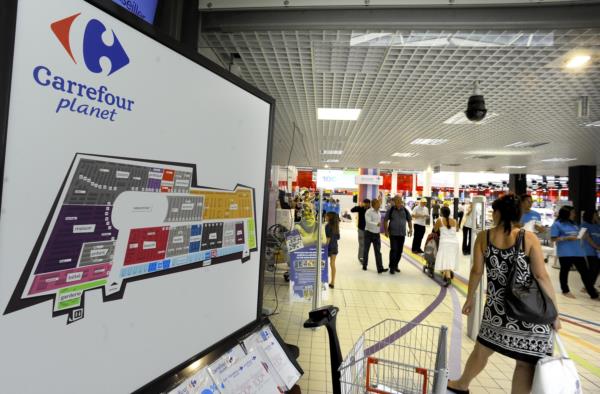Empty soft drink cans hung in a post to be used as ashtrays at Carcavelos beach in Cascais, near Lisbon, Wednesday, Aug. 28, 2013.
Shoppers enter the new Carrefour store Wednesday Aug. 25, 2010 in Ecully, near Lyon, central France.
Car leaves a Carrefour supermarket in Anglet, southwestern France, on Jan.23, 2018.


Picture this: you stroll down the aisles of your favorite supermarket, ready to grab your go-to snacks and beverages. But wait, something is missing. You notice that the global supermarket chain Carrefour has made a bold move - they have stopped selling PepsiCo products in their stores in France, Belgium, Spain, and Italy. Why, you ask? Well, it all comes down to price increases for beloved items like Lay's potato chips, Quaker Oats, Lipton tea, and yes, even Pepsi.
Carrefour didn't hesitate to take action, swiftly pulling PepsiCo products off their shelves in France and plastering small signs that boldly state, 'We no longer sell this brand due to unacceptable price increases.' Talk about making a statement! But this isn't just a company flexing its muscles; it's a response to a new French law designed to combat the soaring cost of living.

Under this law, supermarkets face hefty fines if they fail to strike a deal with suppliers on prices by the end of the month. And Carrefour, with its 12,225 stores in over 30 countries, is not one to take chances. So, the ban on PepsiCo products will extend beyond France to Belgium, Spain, and Italy. However, the exact date of implementation in these three countries remains a mystery.
It's worth mentioning that PepsiCo hasn't stood idly by. In a statement, they expressed their ongoing efforts to resolve the issue with Carrefour, stating, 'We have been in discussion with Carrefour for many months, and we will continue to engage in good faith in order to try to ensure that our products are available.' It seems like both parties are eager to find a resolution to this predicament.
But why the price increases in the first place? PepsiCo claims that they have been forced to raise prices due to the skyrocketing costs of key ingredients like grain and cooking oil. It's no secret that those food commodities experienced a tumultuous ride following Russia's invasion of Ukraine. While global markets have seen prices gradually decline since then, families still feel the pinch at their local supermarkets.
The rising cost of living has not gone unnoticed by the French government. In an effort to alleviate the burden on households, President Emmanuel Macron's administration implemented 'emergency measures' in November. These measures moved up the deadline for price negotiations between supermarkets and suppliers to January 31st, with fines of up to 5 million euros ($5.46 million) looming over grocery companies that fail to meet the new deadline.

Amidst all this turmoil, it's easy to forget that inflation has fallen considerably worldwide. In December, the 20 European Union countries that use the euro currency saw a rebound in consumer prices, increasing by 2.9% from the previous year. However, the cost of food and non-alcoholic drinks has yet to fully ease, remaining 6.9% higher in November compared to the same month in the previous year. It seems that the relief felt on a macroeconomic level hasn't quite trickled down to everyday shoppers.
As consumers, we find ourselves at a crossroads. On one hand, we're facing price increases for our favorite snacks and beverages. On the other hand, we understand the struggles faced by companies like PepsiCo, grappling with higher costs for essential ingredients. It's a delicate balance, and Carrefour's decision to no longer carry PepsiCo products highlights the ongoing tension between suppliers and retailers in this ever-changing landscape.

So, the next time you visit your local Carrefour, don't be surprised if you can't find that familiar can of Pepsi or bag of Lay's chips. It's a sign of the times and a reminder that even global giants have to navigate the complex dance of supply and demand. In the end, let's hope that a compromise is found, allowing both parties to thrive while keeping our taste buds satisfied.
End of Article







